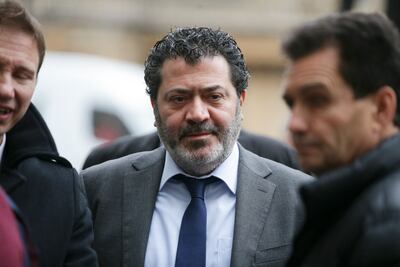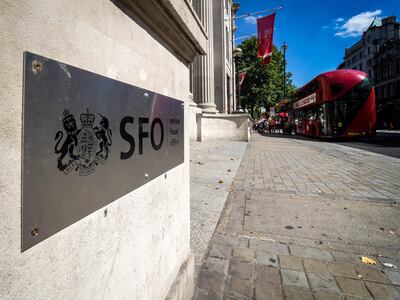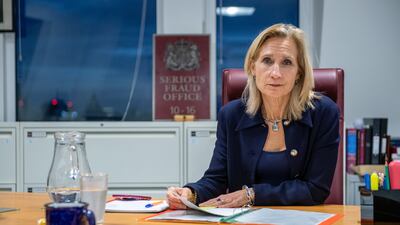Lisa Osofsky was considered a refreshing change when she was appointed as the UK’s chief anti-bribery prosecutor with a five-year contract.
The former FBI lawyer, a 30-year veteran of the US courts, was seen as an outsider in 2018, untainted by a series of courtroom setbacks at the Serious Fraud Office (SFO) that had left the agency facing closure.
Less than four years later, the fate of the agency and its director is back on the agenda after calamitous missteps during a complex prosecution of a Middle East bribery scandal linked to the Monaco-based consultancy Unaoil.
Ms Osofsky – a UK-US dual citizen – now faces a double whammy of critical reports this spring over two unconnected failures at the UK white-collar crime agency charged with investigating and prosecuting the most complex frauds. They both involve the failures of disclosure – the sharing of prosecution documents with defence lawyers to ensure fair trials.
The government last week announced details of the inquiry that will be headed by a former head of the UK’s prosecution service after the SFO failed to hand over documents essential for the defence of a former Unaoil executive, but embarrassing to the SFO and its boss.
The second inquiry scheduled to report in the spring relates to the collapse of prosecutions against two executives accused of defrauding the government over a contract to electronically tag prisoners because of a disclosure failure.
Ziad Akle was jailed for five years in July 2020 for paying bribes to secure a multimillion-dollar contract in the Iraqi energy sector. But appeal court judges quashed the hard-won conviction in December last year because of the “serious failure” by the SFO to pass on documents that revealed the horse-trading over suspects behind the four-year inquiry.
It emerged in 2020 that she exchanged “flattering” text messages with a former US Drug Enforcement Agency operative who was acting on behalf of the owners of Unaoil, the Ahsani family.
David Tinsley, who headed a US-based private intelligence company, met Ms Osofsky to try to secure more lenient terms for the Ahsanis, key suspects in the UK inquiry, to the probable cost of Mr Akle and another Iraq-based defendant, Basil Al Jarah.

The appeal court said it was “it was wholly inappropriate for the SFO to have any dealings with Tinsley” because he was not the legal representative of either Mr Akle or Mr Al Jarah.
The failure to pass on full details of the SFO’s contacts with Mr Tinsley led to the quashing of Mr Akle’s conviction. Mr Al Jarah has also launched an appeal after he was sentenced to more than three years in prison.
The pair were among four men convicted after SFO prosecutions for paying a total of $17 million in bribes to secure post-Saddam Hussein oil-related contracts worth $1.7 billion for Unaoil in Iraq. Another company, oilfield services company Petrofac, was ordered to pay £77 million ($104.1 million) after an investigation linked to Unaoil.
Saman Ahsani, the former chief operating officer, and his brother Cyrus, the former chief executive, subsequently admitted their role in a huge international bribery operation to win contracts for oil and gas companies as part of a deal with prosecutors in the US.
The attorney general for England and Wales, Suella Braverman, said that the review into the failings in the Unaoil case was designed to ensure it "can never happen again”.
“There has to be a whole culture change and management change,” said Neil Williams, deputy head of complex crime at Reeds Solicitors. “There does appear to be an entrenched culture at the SFO, which isn’t working."
He said the broad remit of the review could be a sign that the role of the SFO itself was under scrutiny.
“The mandate for the investigation will look beyond the failings in the Unaoil case, but more widely at the function and culture of the SFO as a whole," he said.
Defenders of the SFO point to the extreme complexity of investigations taken on by the agency, which included the unsuccessful prosecution of Barclays Bank executives over “secret payments” to Qatar in return for investment during the 2008 financial crisis.
Ms Osofsky said an average case had 10 million documents – similar to the scale of the Panama Papers leak – while some had ten times that amount.

She has previously blamed errors on systems at the SFO that are ill suited to digital investigations. But shortly after her appointment, she told MPs that she briefed ministers that the SFO was doing better than other prosecution agencies at using technology to analyse documents.
“It was nice to actually go to a meeting and be seen as someone who had been doing some things right,” she told a committee in December 2018.
The ruling Conservative Party pledged to incorporate the SFO into another crime-fighting agency in its manifesto for the 2017 election.
The move was championed by former prime minister Theresa May, who had been critical of its performance.
Some lawyers and some from within the party criticised the policy at a time when the UK had pledged to tackle bribery and corruption and it was never followed through before Mrs May lost the leadership to Boris Johnson in 2019.
After taking on the job at the SFO, Ms Osofsky continued the trend for US-style deferred prosecution agreements that allowed multinationals such as Rolls-Royce to make settlements. The engineering firm paid £671m in a bribery case to settle its legal action.
Ms Osofsky has defended her tenure saying cases in the past five years have contributed £1.3 billion to government coffers.
But questioned last week by MPs about whether she would seek an extension to her contract, which runs until 2023, Ms Osofsky said: “I have not decided.”
Structural reforms loom
Dr Branislav Hock, a senior lecturer in economic crime at the University of Portsmouth, said that the agency was going through a period of change, when public demands to prosecute executives involved in wrong-doing had clashed with attempts to change business behaviour by securing multimillion-pound agreements with companies.
“There are potential clashes and criticisms where these dynamics can overlap,” Dr Hock said. “I think we are not 100 per cent sure in the UK what we want the system to look like.”


